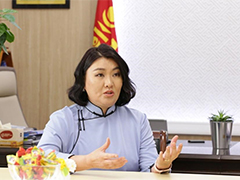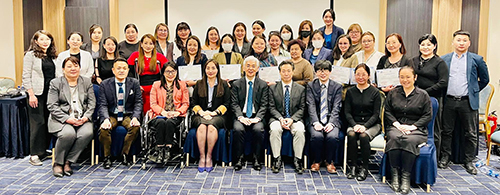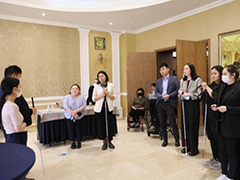- Home
- Technical Cooperation Projects
- Index of Countries
- Asia
- Mongolia
- Project for Promoting Employment of Persons with Disabilities (DPUB2)
- Project News
- Interview with A. Ariunzaya, Minister of Labour and Social Protection "Develop human resources in Mongolia to assist employment of persons with disabilities"
Project News
2022-06-13
Interview with A. Ariunzaya, Minister of Labour and Social Protection
"Develop human resources in Mongolia to assist employment of persons with disabilities"
 A. Ariunzaya, Minister of Labour and Social Protection, heads the Mongolian Government's employment policy for persons with disabilities.
A. Ariunzaya, Minister of Labour and Social Protection, heads the Mongolian Government's employment policy for persons with disabilities.
Mongolia ratified the Convention on the Rights of Persons with Disabilities (CRPD) in 2009 and has strengthened measures to guarantee the rights of persons with disabilities and promote their social participation. To realise them, the government developed legal systems, including the Law on the Rights of Persons with Disabilities in Mongolia promulgated in 2016, which stipulates the rights of persons with disabilities. In 2017, the promotion of employment for persons with disabilities was set as a national goal. Aiming for more solid and continuous development, the Japanese technical cooperation "Project for Promoting Employment of Persons with Disabilities in Mongolia" (in short DPUB2) has been implemented since 2021.
DPUB2 is launching a new series of articles "From the workplace of employees with disabilities in Mongolia". In this column, the project visits Mongolian companies promoting the employment of persons with disabilities, interviews the people concerned multilaterally and considers the realisation of employment that brings happiness to both persons with disabilities and the companies. Before starting this series, we interviewed the Minister of Labour and Social Protection Ariunzaya about the current state of persons with disabilities in Mongolia and the latest developments in employment policies for them.
Q. How many persons with disabilities are there in Mongolia? What is the latest situation?
Minister: The most common cause of disability is general illness (78%), followed by accidents (10%), occupational diseases (5%), road traffic accidents (4%) and occupational accidents (2%). Regarding the type of disability, 11,700 have a visual impairment, 8,400 have a hearing impairment, 4,000 have a speech impairment, 21,000 have a physical impairment, 20,400 have a mental impairment, 7,400 have multiple disabilities, and 33,100 have other types of disability. Of the 9,800 school-aged children with disabilities, 4,300 attend secondary school and 1,200 special schools, while 2,800 are not enrolled and 370 drop out.
Q. What policies are in place to support persons with disabilities?
Minister: Mongolia ratified the CRPD in 2009. Afterwards, in 2016, the Law on the Rights of Persons with Disabilities in Mongolia was promulgated. The Government established its supervising committee, the National Committee for Persons with Disabilities, Subcommittee and Branch committees for persons with disabilities in all provinces and Ulaanbaatar. Moreover, the General Authority for the Development of Persons with Disabilities was established in 2018.
However, the public understanding of disability is not sufficiently developed, and the social participation of persons with disabilities is still limited. Therefore, we must promote cross-sectoral cooperation and create a legal environment. This awareness led to a revised Law on the Rights of Persons with Disabilities and the establishment of a working group to develop a draft Barrier-Free Law. We plan to continue our programme to promote employment for persons with disabilities and provide grant services.
In addition, the Government, with support from donors, has implemented projects addressing situations surrounding persons with disabilities. For example, the "Ensuring Inclusiveness and Service Delivery for Persons with Disabilities Project", implemented by The Asian Development Bank and the Mongolian Government, is working with local six provinces (Khovd, Khövsgöl, Arkhangai, Darkhan-Uul, Dundgovi and Dornod). The project is constructing the Development Centres for the Persons with Disabilities, and 50-65% has been completed. Moreover, the project is building the Employment Development Centres for the Persons with Disabilities in Ulaanbaatar.
Besides, the Mongolian Government and the Japan International Cooperation Agency (JICA) are implementing the DPUB2 from February 2021 to January 2025.
Q. Please tell us about the projects and activities implemented with JICA.
Minister: The Ministry of Labour and Social Protection and JICA have worked together from 2016 to 2020 on "The Project for Promoting Social Participation of Persons with Disabilities in Ulaanbaatar City". The project led to the publication of an annual White Paper on Persons with Disabilities to describe the current situation of persons with disabilities in 2018. Moreover, the Disability Equality Training, launched in 2017 and has reached more than 13,000 participants. The project's second phase, DPUB2, was initiated based on these achievements.
 Lecturers and participants at the Job Coach Introductory Seminar held in May 2022
Lecturers and participants at the Job Coach Introductory Seminar held in May 2022
Q. Please provide details of the activities and objectives of DPUB2.
 The awareness raising seminar for companies, held in Ulaanbaatar in April 2022, included group work to deepen the understanding of disability among human resource personnel in companies.
The awareness raising seminar for companies, held in Ulaanbaatar in April 2022, included group work to deepen the understanding of disability among human resource personnel in companies.
Minister: The project provides the Job Coach Employment Support Service. Furthermore, based on this service, the project aims to train job coaches, the specialised artisans who connect persons with disabilities with companies.
It is a legal obligation for companies to employ persons with disabilities. If they do not fulfil this obligation, they must pay the levy. In Mongolia, most companies currently choose to pay the levy rather than to employ persons with disabilities, although thousands of persons with disabilities wish to work.
There are two reasons behind this ongoing situation. First, companies do not have sufficient knowledge and understanding of persons with disabilities. Second, the education and skills of persons with disabilities looking for work are not sufficiently high. Hence, it is essential to change the companies' awareness and arrange reasonable accommodation in the workplace while increasing the knowledge and skills of persons with disabilities. Therefore, the Job Coach Employment Support Service, which connects persons with disabilities with companies, is significant. Job Coach is a new concept and a new profession in Mongolian society. The project develops human resources for the awareness raising for companies.
Q. Please tell us more about job coaches.
Minister: Companies are truthfully more interested in employing persons with disabilities than in paying the levy. However, they do not adequately understand how to advertise job vacancies and make reasonable accommodations for persons with disabilities. In addition, when a company do hire a person with disabilities but the person does not fulfil the requirements they expected, they tend to be hesitant to hire new staff with disabilities afterwards.
Meanwhile, persons with disabilities seeking work often have many questions about how to search for work, obtain job information and the skills required. Job coaches connect persons with disabilities with companies and help both to solve these problems. Job coaches provide advice and information to companies, which plays a significant role in developing reasonable considerations and environments in the workplace.
Consequently, job coaches are professionals responsible for providing direct support to persons with disabilities and approaching the environment to facilitate a comfortable working environment. The specific work process involves:
- Understanding the characteristics of a person with disabilities.
- Finding a suitable workplace for the person.
- Visiting the workplace to provide the person on-site support with the employer and other staff.
At the same time, job coaches guide work skills, workplace manners and communication support. The goal of DPUB 2 is to provide employment support services for persons with disabilities through job coaches.
Q. Thank you very much for your valuable talk today.
Minister: Thank you.
What is the "Job Coach Employment Support Service"?
The job coach employment support service is a specialised employment support service for persons with disabilities and companies through job coaches, which will be provided from June 2022 by the General Authority for the Development of Persons with Disabilities of Mongolia.
Through this service, hundreds of persons with disabilities are expected to be employed by companies annually. Meanwhile, companies that struggle to employ persons with disabilities must fulfil their social responsibility by paying the levy.

- About JICA
- News & Features
- Countries & Regions
- Our Work
- Thematic Issues
- Types of Assistance
- Partnerships with Other Development Partners
- Climate Change / Environmental and Social Considerations
- Evaluations
- Compliance and Anti-corruption
- Science and Technology Cooperation on Global Issues
- Research
- JICA Development Studies Program / JICA Chair
- Support for the Acceptance of Foreign HRs / Multicultural and Inclusive Community
- Publications
- Investor Relations
